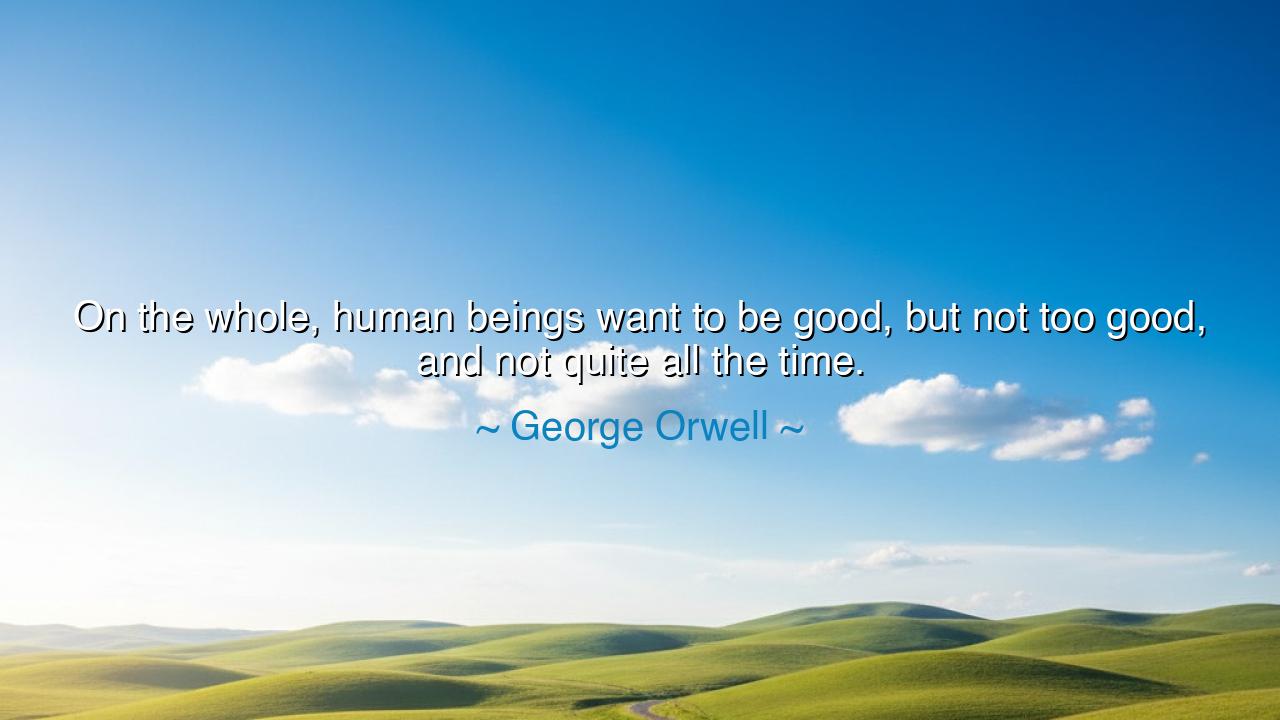
On the whole, human beings want to be good, but not too good
On the whole, human beings want to be good, but not too good, and not quite all the time.






The words of George Orwell, “On the whole, human beings want to be good, but not too good, and not quite all the time,” are not merely a casual observation, but a piercing reflection on the nature of mankind. Orwell, who spent his life exposing hypocrisy, oppression, and the fragile balance between virtue and vice, understood that human beings are torn creatures. They long for goodness, yet often recoil from its demands. They seek to be just, but not when it costs them too dearly. They wish to be moral, but not at the expense of comfort, power, or pleasure. His words reveal the enduring conflict between human aspiration and human weakness.
At its core, this quote speaks to the reality of moral compromise. Few men or women dream of being wicked for wickedness’ sake. Most wish to think of themselves as decent, kind, upright. Yet Orwell reminds us that this desire is tempered by convenience. The human heart often whispers, “I will be good when it suits me, but when it is too heavy, I will set goodness aside.” Thus, virtue becomes a garment we put on in daylight, but often discard when the night of temptation arrives. The truth of his statement lies in its unflinching honesty—human beings want to be good, but with limits.
We see this truth in the story of Pontius Pilate, who knew Jesus to be innocent but lacked the courage to defy the crowd. Pilate wanted to do what was right, but not at the cost of disorder or his position. He washed his hands, convincing himself that he had done enough, when in truth he had simply drawn the line where virtue became inconvenient. This moment in history is one of the clearest reflections of Orwell’s insight: man wants to be good, but only so far, and only when the price does not burn too much.
Yet the saying does not condemn mankind outright—it holds a mirror to us. For who among us has not chosen the easier path when we knew the harder one was right? Orwell understood that this struggle is not unique to the corrupt or the powerful, but universal. Even the kindly neighbor may falter in truth-telling. Even the devoted friend may betray in a moment of weakness. Thus, his quote does not mock us, but calls us to humility, reminding us of our flawed nature and the vigilance required to truly live with integrity.
But there is also a note of hope in these words. If humans did not long for goodness at all, the world would drown in cruelty. The fact that we wish to be good, even if imperfectly, shows that conscience is alive within us. The problem is not the absence of virtue, but the lack of perseverance. If men and women can learn to stretch beyond convenience, to embrace goodness not just in favorable times but in trials, then they can rise above the half-hearted virtue Orwell describes.
To the seekers of wisdom, let this teaching be a challenge: do not settle for being “good enough.” Strive to be good even when it costs you. Do not wear virtue only in moments of ease, but let it clothe you in moments of hardship. Examine your own life and ask: Where do I stop being good? Where do I make excuses to compromise? These questions pierce deeply, but they are the gateway to growth.
The practical lesson is this: practice consistency of character. Begin with small acts—keeping your word when no one is watching, speaking truth even when silence would protect you, giving help when it is inconvenient. These small sacrifices strengthen the muscle of virtue, so that when greater trials arise, you will not shrink back. Resist the temptation to draw lines around your goodness. For true integrity is not occasional—it is steadfast, even when difficult.
Thus, let Orwell’s words endure not as a condemnation, but as a beacon: human beings want to be good, but must learn to want it wholly, and at all times. Only then will goodness become not a mask we wear, but a fire within that does not fade. The struggle is great, but so too is the reward: the peace of a conscience unbroken, and the legacy of a life lived in truth.






AAdministratorAdministrator
Welcome, honored guests. Please leave a comment, we will respond soon